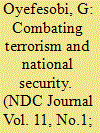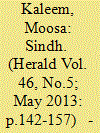| Srl | Item |
| 1 |
ID:
120047


|
|
|
|
|
| Publication |
2013.
|
| Summary/Abstract |
Many experts argue that climate change will exacerbate the severity and number of extreme weather events. Such climate-related hazards will be important security concerns and sources of vulnerability in the future regardless of whether they contribute to conflict. This will be particularly true where these hazards put large numbers of people at risk of death, requiring the diversion of either domestic or foreign military assets to provide humanitarian relief. Vulnerability to extreme weather, however, is only partially a function of physical exposure. Poor, marginalized communities that lack access to infrastructure and services, that have minimal education and poor health care, and that exist in countries with poor governance are likely to be among the most vulnerable. Given its dependence on rainfed agriculture and its low adaptive capacity, Africa is thought to be among the most vulnerable continents to climate change. That vulnerability, however, is not uniformly distributed. Indicators of vulnerability within Africa include the historic incidence of climate-related hazards, population density, household and community resilience, and governance and political violence. Among the places in Africa most vulnerable to the security consequences of climate change are parts of the Democratic Republic of the Congo, Guinea, Sierra Leone, Somalia, and South Sudan.
|
|
|
|
|
|
|
|
|
|
|
|
|
|
|
|
| 2 |
ID:
130692


|
|
|
| 3 |
ID:
139806


|
|
|
|
|
| Summary/Abstract |
Although consociational-style ethnic power-sharing arrangements are frequently adopted in postconflict African states, their track record is spotty at best. Using post-civil war Nigeria (one of Africa's most durable experiments with ethnic proportionality in government), I argue that the failure of formal ethnic power-sharing in Africa is due to its intersection with the largely informal power-sharing practices characteristic of neopatrimonial political systems. In Nigeria, well-intentioned policies meant to ensure ethnic proportionality reinforce the power of patronage networks that also rely on ethnic and kinship mobilization to capture state resources. As a result, entrenched ethnic power sharing in Nigeria's federal constitution since the late 1970s has played a key role in the country's descent into corruption and poor governance.
|
|
|
|
|
|
|
|
|
|
|
|
|
|
|
|
| 4 |
ID:
110114


|
|
|
|
|
| Publication |
2012.
|
| Summary/Abstract |
A trend setter in Asia up to the sixties, economic management in Pakistan has steadily
deteriorated to the point where the economy has, for the past few decades, lurched
from one financial crisis to the next. At the heart of the problem has been the poor
management of public finances and deep-seated unresolved structural issues in the
economy that bad management and poor governance has exacerbated. The consequences of this secular decline in economic governance are plain to see: macroeconomic instability, high inflation, poor public services, criminal neglect of the social sectors, widespread corruption, crippling power outages, growing unemployment, deepening poverty and a deteriorating debt profile.
2
|
|
|
|
|
|
|
|
|
|
|
|
|
|
|
|
| 5 |
ID:
119577


|
|
|
| 6 |
ID:
131382


|
|
|
| 7 |
ID:
123362


|
|
|
|
|
| Publication |
2013.
|
| Summary/Abstract |
[T]he incumbent forces have reformulated old strategies to deflect contenders for power while narrowing the political space for substantive reform.
|
|
|
|
|
|
|
|
|
|
|
|
|
|
|
|